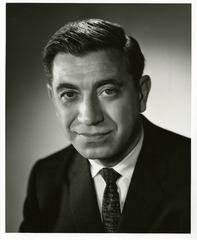Stanley Yolles
American psychiatrist and public health administrator
Stanley F. Yolles was a prominent American psychiatrist and public health administrator, known for his contributions to mental health policy and administration in the United States. He served as the director of the National Institute of Mental Health (NIMH) and played a significant role in advancing mental health research and services.
Early Life and Education[edit | edit source]
Stanley F. Yolles was born in 1919. He pursued his education in psychiatry, which laid the foundation for his future career in mental health administration. Yolles completed his medical degree and specialized in psychiatry, a field that was gaining increasing importance in the mid-20th century.
Career[edit | edit source]
Yolles began his career in psychiatry at a time when mental health was becoming a critical area of public health. His work in the field led to his appointment as the director of the National Institute of Mental Health in 1964. During his tenure, he focused on expanding mental health services and integrating mental health into broader public health initiatives.
Director of the National Institute of Mental Health[edit | edit source]
As the director of NIMH, Yolles was instrumental in promoting mental health research and policy. He advocated for increased funding for mental health research and worked to improve the quality of mental health care in the United States. Under his leadership, NIMH expanded its research programs and increased its focus on community mental health services.
Yolles was a strong proponent of deinstitutionalization, a movement aimed at reducing the population of mental health patients in large institutions and providing care in community settings. This approach was part of a broader effort to humanize mental health care and make it more accessible to the general population.
Contributions to Mental Health Policy[edit | edit source]
Yolles's contributions to mental health policy were significant. He worked to integrate mental health services into general health care and advocated for policies that supported mental health research and treatment. His efforts helped to shape the direction of mental health policy in the United States during a critical period of change.
Later Life and Legacy[edit | edit source]
After his tenure at NIMH, Yolles continued to be active in the field of mental health. He remained a vocal advocate for mental health issues and contributed to various initiatives aimed at improving mental health care. Yolles passed away in 2001, leaving behind a legacy of significant contributions to the field of psychiatry and public health.
Related Pages[edit | edit source]
Search WikiMD
Ad.Tired of being Overweight? Try W8MD's physician weight loss program.
Semaglutide (Ozempic / Wegovy and Tirzepatide (Mounjaro / Zepbound) available.
Advertise on WikiMD
|
WikiMD's Wellness Encyclopedia |
| Let Food Be Thy Medicine Medicine Thy Food - Hippocrates |
Translate this page: - East Asian
中文,
日本,
한국어,
South Asian
हिन्दी,
தமிழ்,
తెలుగు,
Urdu,
ಕನ್ನಡ,
Southeast Asian
Indonesian,
Vietnamese,
Thai,
မြန်မာဘာသာ,
বাংলা
European
español,
Deutsch,
français,
Greek,
português do Brasil,
polski,
română,
русский,
Nederlands,
norsk,
svenska,
suomi,
Italian
Middle Eastern & African
عربى,
Turkish,
Persian,
Hebrew,
Afrikaans,
isiZulu,
Kiswahili,
Other
Bulgarian,
Hungarian,
Czech,
Swedish,
മലയാളം,
मराठी,
ਪੰਜਾਬੀ,
ગુજરાતી,
Portuguese,
Ukrainian
Medical Disclaimer: WikiMD is not a substitute for professional medical advice. The information on WikiMD is provided as an information resource only, may be incorrect, outdated or misleading, and is not to be used or relied on for any diagnostic or treatment purposes. Please consult your health care provider before making any healthcare decisions or for guidance about a specific medical condition. WikiMD expressly disclaims responsibility, and shall have no liability, for any damages, loss, injury, or liability whatsoever suffered as a result of your reliance on the information contained in this site. By visiting this site you agree to the foregoing terms and conditions, which may from time to time be changed or supplemented by WikiMD. If you do not agree to the foregoing terms and conditions, you should not enter or use this site. See full disclaimer.
Credits:Most images are courtesy of Wikimedia commons, and templates, categories Wikipedia, licensed under CC BY SA or similar.
Contributors: Prab R. Tumpati, MD

